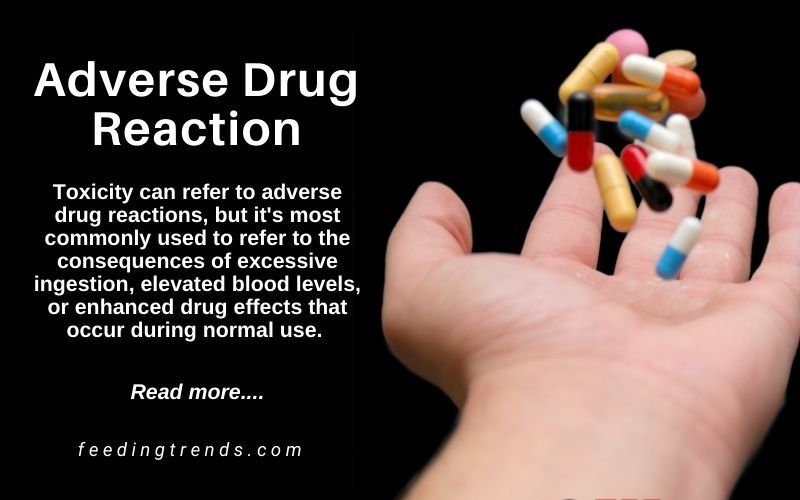
Adverse Drug Reaction That You Must Be Aware Of
Toxicity can refer to adverse drug reactions, but it's most commonly used to refer to the consequences of excessive ingestion, elevated blood levels, or enhanced drug effects that occur during normal use.

To learn more about the toxicity of specific drugs. A side effect is a term used to describe unintended drug side effects that occur within the therapeutic range. Before a drug is prescribed, a risk-benefit analysis (comparison of the likelihood of benefit vs. the risk of ADRs) is required.
Adverse drug reactions account for 3 to 7% of all hospitalizations in the United States. ADRs occur in 10 to 20% of hospitalizations, with about 10% to 20% of these ADRs being severe.
The number of ADRs that occur in ambulatory and nursing home patients is not included in these figures. ADRs are a significant public health problem that is, for the most part, preventable, even though the exact number is unknown.
A patient's age, ***, ethnicity, coexisting disorders, genetic or geographic factors, as well as drug factors, influence the occurrence and severity of adverse drug reactions (eg, type of drug, administration route, treatment duration, dosage, bioavailability).
With advanced age and polypharmacy, the risk increases. Although age may not be the primary cause, ADRs are more severe in older patients. It's unclear how much prescribing and adherence errors contribute to the occurrence of ADRs.
Adverse Drug Reactions: What Causes Them?
The majority of adverse drug reactions are dose-related, while others are allergic or idiosyncratic in nature. ADRs that are dose-related are usually predictable; ADRs that are not dose-related are usually unpredictable.
When drugs have a narrow therapeutic index, dose-related ADRs are especially concerning (eg, hemorrhage with oral anticoagulants). Drug-drug interactions, as well as decreased drug clearance in patients with impaired renal or hepatic function, can cause ADRs.
Allergic ADRs are dose-independent and necessitate prior exposure. Following sensitization, a patient's subsequent exposure to the drug causes one of several types of allergic reactions. Allergy ADRs can sometimes be predicted using clinical history and appropriate skin tests.
Idiosyncratic ADRs are unanticipated, non-dosage-related, or allergic ADRs. They affect only a small percentage of patients who are given medication. Idiosyncrasy is a broad term that refers to an abnormal drug response caused by genetic factors; however, pharmacogenetic factors do not cause all idiosyncratic reactions.
Diagnosis of Adverse Drug Reactions
- Consider rechallenge
- Report suspected ADRs to MedWatch
Symptoms that appear shortly after taking a drug are frequently linked to its use. However, diagnosing symptoms caused by long-term drug use necessitates a high level of suspicion and is frequently difficult.
Stopping a drug is sometimes necessary, but it can be difficult if the drug is necessary and no acceptable substitute exists. Rechallenge should be considered when proof of the drug-symptom relationship is critical, except in the case of severe allergic reactions.
The majority of suspected adverse drug reactions should be reported to MedWatch (the FDA's ADR monitoring program), which is an early warning system. Only by reporting unexpected ADRs can they be identified and investigated. Changes in the nature and frequency of ADRs are also monitored by MedWatch. ADR reporting via the internet is encouraged.
The Physicians' Desk Reference and the FDA News Daily Drug Bulletin, as well as calling 800-FDA-1088, have ADR reporting forms and information. Nurses, pharmacists, and other healthcare professionals should also report ADRs. The FDA's Adverse Event Reporting System (FAERS) is a search engine that makes data on adverse drug reactions more accessible.
Severe or fatal adverse drug reactions have a very low incidence (typically 1 in 1000) and may go undetected in clinical trials because they are not designed to detect low-incidence ADRs. As a result, these ADRs may not be discovered until after a drug has been widely distributed and used.
Clinicians should not assume that just because a drug is on the market, it comes with a list of all adverse reactions. For tracking low-incidence ADRs, postmarketing surveillance is critical.
Treatment of Adverse Drug Reactions
- Dosage adjustments
- Drug discontinuation if necessary
- Switching to a different medication
Modifying the dose or eliminating or reducing precipitating factors may be sufficient for dose-related adverse drug reactions. It is rarely necessary to increase the rate of drug elimination.
The drug should usually be stopped and not tried again if allergic or idiosyncratic ADRs occur. Allergic ADRs frequently necessitate switching to a different drug class, while dose-related ADRs may necessitate switching to a different drug class. An opioid receptor antagonist such as lubiprostone, for example, may help with opioid-induced constipation.
Appreciate the creator